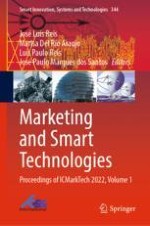2024 | OriginalPaper | Buchkapitel
2. The AI Evolution in Marketing and Sales: How Social Design Thinking Techniques Can Boost Long-Term AI Strategies in Companies and Regions
verfasst von : Margarethe Überwimmer, Elisabeth Frankus, Laura Casati, Shauna Stack, Tomáš Kincl, Lucie Sára Závodná
Erschienen in: Marketing and Smart Technologies
Verlag: Springer Nature Singapore
Aktivieren Sie unsere intelligente Suche, um passende Fachinhalte oder Patente zu finden.
Wählen Sie Textabschnitte aus um mit Künstlicher Intelligenz passenden Patente zu finden. powered by
Markieren Sie Textabschnitte, um KI-gestützt weitere passende Inhalte zu finden. powered by
